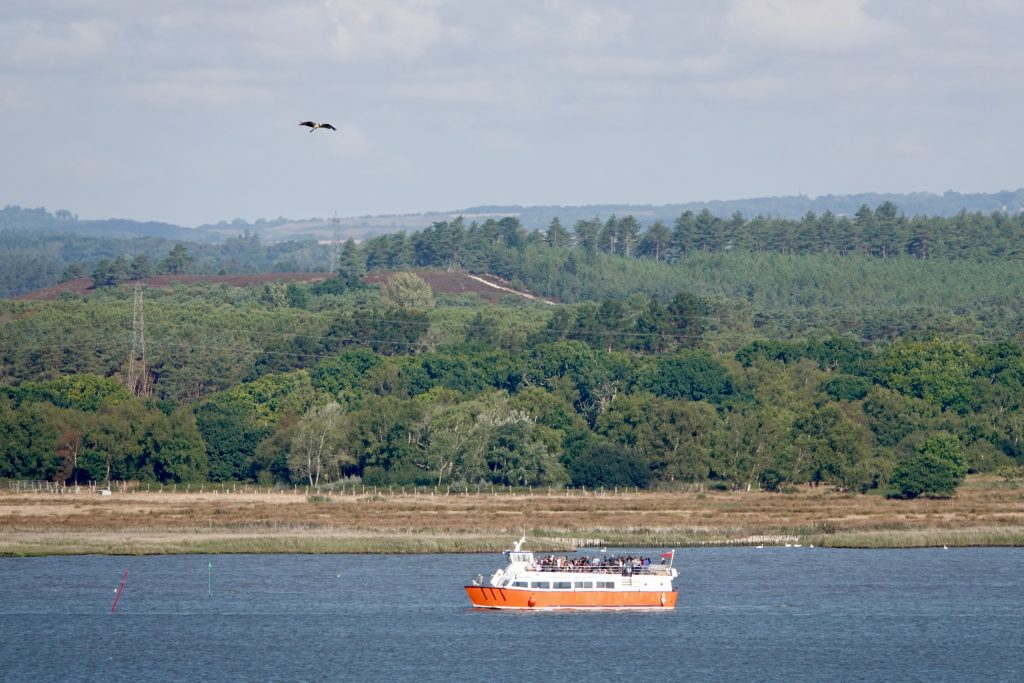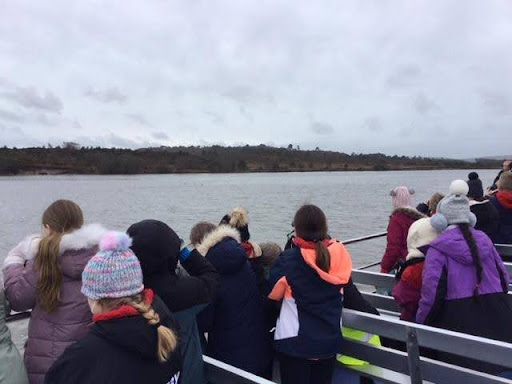What a season it’s been, with our harbour pair 022 and CJ7 fledging 4 hardy, healthy strong youngsters this summer, which as far as we know, all migrated away safely by the beginning of September. Since 2022, 022 and CJ7 have now fledged 9 young in total from the harbour nest which is a great result, and we look forward to seeing the safe return of some of these individuals over the next few years. Of course, this spring we did see our first wild-fledged youngster arrive back, with female 5H1 dropping in to the harbour briefly at the end of May before then moving off and being seen at several sites across the country including places in Wales, Rutland and Northamptonshire. For those that have been following our Osprey story since the very beginning will know that some of our female Ospreys which were released as part of the project are now breeding in Wales. If you add the number of young that have fledged from those nests too, then the total number of young Osprey that have fledged as a direct result of our Poole Harbour Translocation Project now stands at 25 individuals. This is fantastic news, as this is 25 more young Ospreys that can potentially enter the UK population which wouldn’t have had it not been for the project.
Of course, there’s still a long way to go, and still, with only one nest here in Dorset/Southern Britain the situation is fragile, because by no means does a single nest secure the bases of a population…..we need more!
Last spring another of our male Ospreys returned to Poole Harbour, a bird called 374. He did exactly what we’d expect a 2-year old male Osprey to do which was to return a bit later in the spring, explore the wider landscape before then showing an interest in some of our harbour nest platforms. During June, July and August of 2023, male 374 started showing real interest in setting up a new territory within Poole Harbour and was seen carrying sticks to various nests which is what we hoped he would do. He spent most of that time on his own, and other than engaging with a few migrant Osprey he failed to draw in a potential mate. He then left in late August 2023 and all our fingers were crossed for his safe return in spring 2024, where he had the potential to find a new mate.
As the long, cold winter came to an end and finally gave way to spring, we saw an incredibly early return of our breeding pair with 022 arriving on March 26th and CJ7 arriving the following day on March 27th. They both got straight down to business, re-building the nest, mating and eventually laying eggs. This was a great start, but what about 374? Was he going to return and could we see two nests potentially? March turned into April and each day we waited, hoping for a photo to come through from one of our Osprey nest trail cameras. It felt like an eternity, but finally on April 17th we got a photo of a male, blue-ringed Osprey on one of our nests……YES!! It was 374. He was back.
Surely it was now just a waiting game, as we’d seen a dramatic increase in the number of wandering females who were now showing an interest in Poole Harbour because of the established nest. However, it didn’t quite go to plan. No sooner had he arrived, he then disappeared and wasn’t seen again for 4 weeks! Where had he gone? Why didn’t he stick around? It wasn’t until later in May we finally had some photos of him sent to us by a photographer who had seen him at Fishlake Meadows in Romsey. Phew! At least we knew he was Ok, but we’d rather he came ‘home’. Other than that brief encounter at Fishlake Meadows he soon disappeared again and wasn’t seen again for several weeks. That was until he then turned up back in Poole Harbour in July, however this time with a female in tow. As it transpired it was a blue-ringed female from Rutland Water called ‘1H1’. A perfect mate for him considering CJ7 also came from the Rutland population. Although by now it was too late in the season for 374 and 1H1 to try and breed, there was definitely enough time to build and develop a bond and search out suitable potential nest sites for next spring. It all started looking really exciting when the pair went back to his favourite nest platform in the harbour, where they were both adding sticks over a few days, with potential breeding for next year looking a very real possibility. That was until our local male 022 showed up and very quickly took a disliking to their presence and aggressively and vocally soon saw them off out of the area. Now we understand why 374 didn’t stick around much in the spring!
Male Osprey 374 and female 1H1 on Poole Harbour nest platform in mid-July before being ‘seen off’ by local male Osprey 022

It all went quiet again and we weren’t sure where the ‘new pair’ were until we received a tip off about a pair being seen at an undisclosed site just north of the harbour. So, our team went and staked out the location whilst liaising with our source of information and sure enough a male and female Osprey were active at the site and seemed to be interested in the area. We mobilised really quickly and spoke with a few local landowners about getting a nest platform built ASAP, as we know this can help and speed up the process of Ospreys setting up territories. We found a willing landowner and built the nest on July 30th this summer which is on completely private and inaccessible land which is just what the Ospreys need.
Paul Morton and Tim Mackrill carrying out the ‘strength test’ of the new nest. Stand in the middle and see what happens!

As always, we also installed one of our motion sensor 4G trail cameras to see if 374, 1H1 or any Ospreys took a liking to our new nest during the rest of the season. A couple of days went by and other than a few Stock Dove there had been no visits. Then, on August 3rd….Touch Down! 374 landed on the nest and seemed to be impressed with the new real estate that had appeared in the landscape. He spent the next few days visiting several times a day, moving sticks around and genuinely taking an interest in the new nest.
Male Osprey 374 landing on new nest for the first time

This was a great sign. But even better was on August 5th when he was then joined by female 1H1 who arrived eating a fish on the nest. No doubt caught and presented to her by 374 as part of their pair bonding. During the rest of August 374 and 1H1 visited the new nest every few days, adjusting sticks and seemingly making themselves at home. What a result. The last sighting of them on the nest was on August 26th which is when we assume they left on migration.
This is obviously great news for the project and we truly hope we see their safe return next spring. It’s important to remember though, that although this is an encouraging development, there’s no guarantee that a) either or both will return next year, or that b) this is where they’ll choose to nest next year. They could easily end up back here in Poole Harbour, find a new site, or even build their own nest somewhere. It may be that 374 even finds a new mate should 1H1 return late? Who knows? But that’s the magic of Ospreys. It’s always the unknown that keeps us guessing and intrigued.
So, until next spring, here are a few photos of 374 and 1H1 on the nest together in August this year.
Male Osprey 374 and female 1H1 on the new nest for the first time together on Aug 5th

Male Osprey 374 mantling on new nest as 1H1 does nest preparations

















